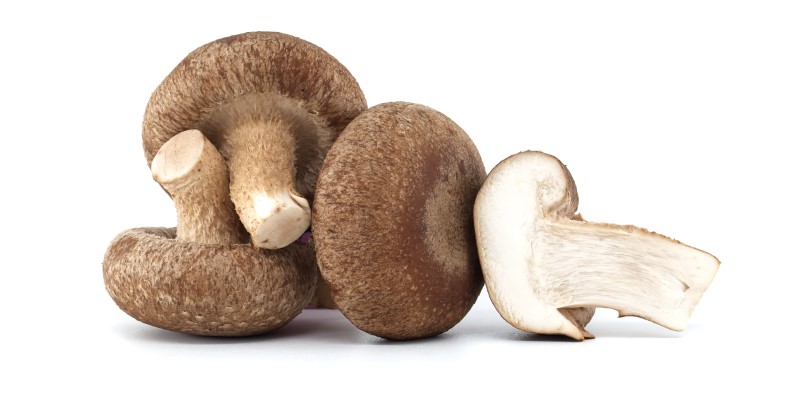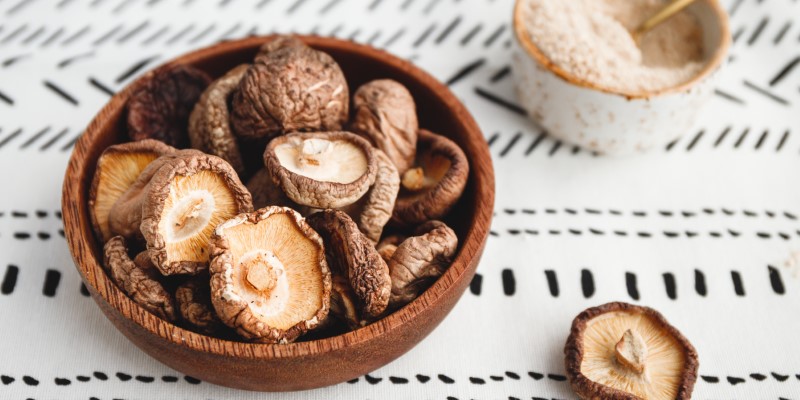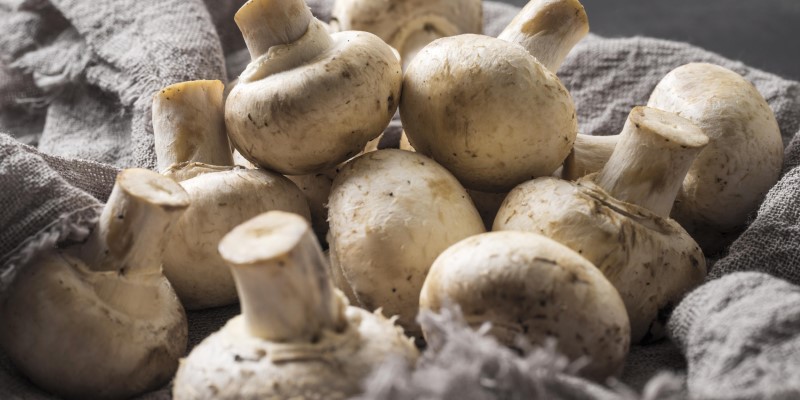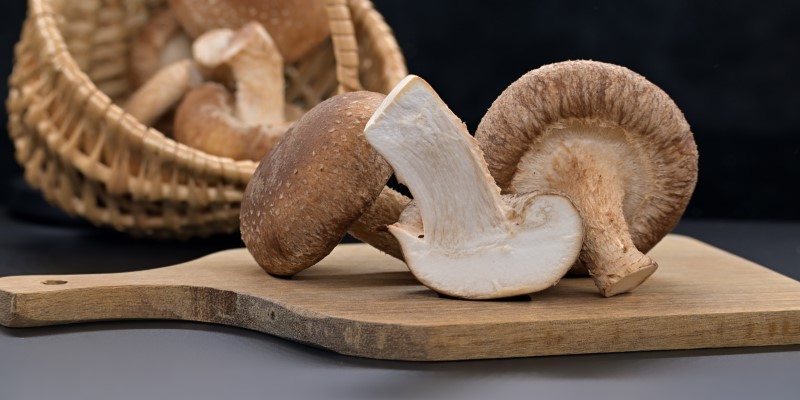Advertisement
Sep 09, 2024 By Tooba

Medicinal mushrooms have been used for centuries in traditional medicine, and they’re gaining renewed interest today for their potential health benefits. These fungi are more than just culinary ingredients; they are packed with bioactive compounds that may support various aspects of health. As scientific research progresses, the medicinal properties of mushrooms are becoming more widely recognized, making them a popular choice for those seeking natural ways to boost their well-being.
What Are Medicinal Mushrooms?
Medicinal mushrooms are specific fungi known for their health benefits, containing bioactive compounds like polysaccharides, triterpenoids, and beta-glucans. Unlike culinary mushrooms, these have been used for centuries in Eastern medicine, particularly in Chinese and Japanese traditions, to support immune function, reduce inflammation, and provide antioxidant effects. Today, they are increasingly popular in modern wellness practices, available in various forms such as powders, capsules, teas, and tinctures, and are valued for their potential to promote overall health.

The Science Behind Medicinal Mushrooms
Research on medicinal mushrooms shows promise due to their rich antioxidant content, which helps combat oxidative stress and inflammation, key factors in chronic diseases. Beta-glucans in these mushrooms may also enhance the immune system, potentially protecting against infections and cancer. While further research is needed, current findings suggest medicinal mushrooms could support overall health.
Key Health Benefits Of Popular Medicinal Mushrooms
Different medicinal mushrooms offer unique health benefits. Below are some of the most popular types and their potential advantages.

Reishi: The Mushroom Of Immortality
Reishi, often referred to as the "Mushroom of Immortality," has been used in traditional medicine for over 2,000 years. This mushroom is known for its immune-boosting properties, primarily due to its high content of beta-glucans and triterpenoids. Reishi is also thought to have adaptogenic qualities, helping the body manage stress and fatigue. Additionally, some studies suggest that Reishi may improve sleep quality, reduce anxiety, and support cardiovascular health by lowering blood pressure and cholesterol levels.
Lion’s Mane: The Brain Booster
Lion's Mane mushroom is noted for its potential cognitive benefits, primarily due to compounds like hericenones and erinacines that may stimulate nerve growth factor (NGF). NGF supports neuron growth and maintenance, potentially enhancing memory, focus, and brain health. Additionally, Lion's Mane might offer neuroprotective effects, potentially aiding in the prevention or slowing of neurodegenerative diseases like Alzheimer's.
Chaga: The Antioxidant Powerhouse
Chaga is known as an antioxidant powerhouse due to its high melanin and superoxide dismutase (SOD) content, which neutralizes free radicals and may prevent cellular damage. It’s also believed to support immune function, reduce inflammation, and help regulate blood sugar. Some research hints at anti-cancer properties, though more studies are needed for confirmation.
Shiitake: The Heart Health Supporter
Shiitake mushrooms are not only a culinary favorite but also a medicinal powerhouse. They are rich in polysaccharides, particularly lentinan, which is known for its immune-boosting and anti-tumor properties. Shiitake mushrooms are also believed to support heart health by lowering cholesterol levels and improving circulation. In addition, they contain compounds that may help fight off infections and improve skin health.
How To Incorporate Medicinal Mushrooms Into Your Diet?
Incorporating medicinal mushrooms into your diet is relatively easy, thanks to the variety of forms available. Whether you prefer whole mushrooms, powders, capsules, or teas, there are plenty of ways to enjoy the health benefits these fungi offer.

Adding Mushrooms To Meals
One of the simplest ways to benefit from medicinal mushrooms is by incorporating them into your meals. Mushrooms like Shiitake and Lion’s Mane can be sautéed, roasted, or added to soups and stir-fries. Reishi, on the other hand, is often too bitter to eat directly but can be simmered in teas or soups to extract its beneficial compounds.
Using Mushroom Supplements
If cooking with mushrooms isn't your preference, supplements are a convenient alternative. Mushroom powders can be easily added to smoothies, coffee, or oatmeal. Capsules and tinctures are also widely available and offer a more concentrated dose of the mushroom's active compounds. When choosing supplements, it's important to select high-quality products that are free from fillers and made from the mushroom's fruiting body rather than just the mycelium.
Drinking Mushroom Teas
Mushroom teas are another popular way to incorporate medicinal mushrooms into your diet. Teas made from Reishi, Chaga, or Cordyceps are widely available and offer a soothing way to enjoy the benefits of these fungi. You can find pre-made tea bags or loose mushroom powder that can be steeped in hot water. Some people also like to add a dash of honey or lemon to enhance the flavor.

Potential Side Effects And Precautions
While medicinal mushrooms are generally considered safe for most people, it’s important to be aware of potential side effects and take precautions, especially if you have underlying health conditions or are taking medications.
Allergic Reactions
Some individuals may be allergic to certain types of mushrooms, which can lead to symptoms like skin rashes, itching, or difficulty breathing. If you’re trying a new mushroom for the first time, start with a small amount to see how your body reacts.
Interaction With Medications
Medicinal mushrooms can interact with certain medications, particularly immunosuppressants, blood thinners, and blood pressure medications. For example, Reishi is known to have blood-thinning properties, which can enhance the effects of blood-thinning medications and increase the risk of bleeding. It’s important to consult with a healthcare provider before adding medicinal mushrooms to your regimen, especially if you’re on prescription drugs.
Potential Digestive Issues
Some people may experience digestive issues, such as bloating or nausea, when consuming medicinal mushrooms, particularly in large amounts. To minimize these effects, start with a smaller dose and gradually increase it as your body adjusts. If you have a history of digestive problems, opt for capsules or teas, which are often easier on the stomach.

Conclusion
Medicinal mushrooms offer a range of potential health benefits, from boosting immune function to improving cognitive health and enhancing physical performance. Whether you choose to incorporate them into your meals, take supplements, or enjoy them in tea form, these fungi can be a valuable addition to a balanced, health-conscious lifestyle.
However, it’s essential to be mindful of potential side effects and consult with a healthcare provider if you have any concerns. As research continues to unveil more about these fascinating organisms, medicinal mushrooms are likely to become an even more prominent part of modern health and wellness practices.
-

The Importance Of Doctor Recommendations In Consumer Health Decisions
Aug 27, 2024
-

Medical Robotics: Transforming Surgeries And Rehabilitation
Sep 09, 2024
-

Who Needs to Consider Functional Medicine?
Jan 01, 2000
-

What Makes Medicinal Mushrooms the Hottest Health Trend?
Aug 28, 2024
-

What Tech Tools Can Help Improve Your Sleep Quality?
Sep 09, 2024
-

Contrast Therapy: How Alternating Hot And Cold Is Shaping Recovery
Sep 09, 2024
-

How is AI Revolutionizing Healthcare Diagnostics in 2024?
Aug 28, 2024
-

What Are The Benefits Of Personalized Medicine For Patients?
Aug 27, 2024
-

What Are the Benefits of Peripheral Heart Action Training?
Aug 28, 2024
-

What Are The Health Benefits Of Medicinal Mushrooms?
Sep 09, 2024
-

Current Legislative And Regulatory Changes In Healthcare
Aug 27, 2024
-

How Do Structural Barriers Impact Community Health?
Aug 27, 2024
-

Why Genetic Testing Can Save Your Life
Jan 01, 2000
-

Why Are Bodycare Innovations Stealing the Spotlight from Facial Skincare?
Aug 28, 2024